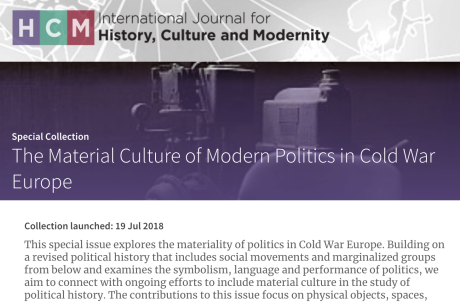The Material Culture of Modern Politics in Cold War Europe
This special issue explores the materiality of politics in Cold War Europe. Building on a revised political history that includes social movements and marginalized groups from below and examines the symbolism, language and performance of politics, we aim to connect with ongoing efforts to include material culture in the study of political history. The contributions to this issue focus on physical objects, spaces, and bodies. More specifically, they analyze the built environment, consumer goods, and social practices to reveal the intersection of materiality and politics. Conceptually, they demonstrate various ways in which objects became intrinsic to politics and served as a medium for political expression, representation and contestation. Placing particular emphasis on how material culture generated unexpected or unintended dynamics, the contributions also trace objects as source of resilience in the political process. Taken as a whole, this special issue argues that material culture is essential for understanding the political as a fluid and contingent category.
Introduction: The Material Culture of Politics Authors: Jan Hansen, Jochen Hung , Andrew Tompkins, Philip Wagner
The Material Culture of Parliament. A case study of the Dutch Second Chamber, 1945–2000 Authors: Carla Hoetink , Harm Kaal
A ‘Call to Tools’: DIY between State Building and Consumption Practices in the GDR Author: Reinhild Kreis
The Material Culture of Human Rights. Consumer Products, Boycotts and the Transformation of Human Rights Activism in the 1970s and 1980s Author: Benjamin Möckel
Continuing Politics by Other Means: Giving in Cold War Europe Author: Cristian Capotescu

0 Comments